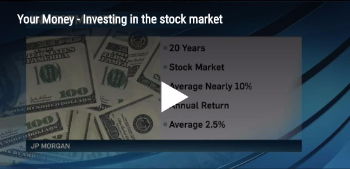Are you your worst enemy when it comes to investing for your future? Behavior scientists may say “yes”. People want safety and comfort. Unfortunately, such natural instincts may be the opposite of what it takes to invest successfully in the stock market.
What stops investors from doing well in the stock market? The study of behavioral finance combines psychology with finance in an effort to explain why people make irrational investment decisions. Many studies indicate that how we are wired can potentially undermine our ability to build wealth in the markets over time.
Warren Buffett summarizes this concept in his quote “Investing is simple, but not easy.” Buffett suggests that illogical thinking and emotions can pave the way for poor decisions and loss of wealth.
Chasing Returns
It’s simple, but not easy to pass on popular opportunities.
If you tune into the investment media or talk with friends about the stock market, you have probably felt the urge to invest in a hot company, booming industry, or the latest amazing product. As humans, we are naturally drawn to things that other people like and find valuable.
The problem with this logic when investing: If other people like the investment, and ultimately buy it, the price goes up. If the price goes up before you buy in, then you are essentially buying high. You jump in because your greatest fear is missing out on an investment return that others might attain.
An example of this occurred July 2014 to June 2015 when China’s Shanghai Composite Index (China’s equivalent of the S&P 500 in the U.S.) shot up almost 150% without an accompanying rise in economic growth or earnings. The upswing was driven by individual working-class investors buying stocks with borrowed money, i.e. joining in the frenzy. As a result of this wave of irrational buying, the Shanghai Composite Index suffered a crash in June 2015, declining more than 30% and sending global markets into a heightened period of volatility.
Remember that the herd mentality can work against you!
Running for the Exits
It’s simple, but not easy to stay invested during challenging market environments.
When investing, we often have to ignore our natural tendency to sell out in a declining market. To illustrate, if something negative happens in everyday life, for example your arm gets scraped and begins to bleed, what does your instinct tell you to do? Your natural reaction is to stop the bleeding as soon as possible.
When the markets get choppy and experience an inevitable downturn, the knee-jerk reaction is to stop the bleeding and sell out. While your instinct may be telling you this is a good idea, it can have negative effects on the long-term growth of your portfolio.
It is impossible to know exactly when a market downturn will reverse, and history shows that investors often make the wrong decision when running for the exit or attempting to time the market. Exiting the market at the wrong time can lead to missing out on recoveries and ultimately paralyzing your portfolio’s ability to grow.
Most Investors Underperform the Market
JP Morgan conducted a study that illustrates the result of investors making the wrong decisions at the wrong times. Over the past 20 years, the average investor earned only 2.5% per year, which barely outpaces the 2.4% rate of inflation. Over the same time period, the average return per year was 9.9% for the U.S. stock market, 5.4% for international stocks, and 6.2% for U.S. bonds. Simply staying invested for the last 20 years would have exceeded the average investor regardless of your combination of stocks and bonds.
What to Do and Not Do
Do: An investment plan must be constructed with proper due diligence. This means choosing investments based on sound financial analysis and not on media hype.
Do Not: An investor must not deviate from the plan when faced with short-term volatility. Investors must control natural tendencies to jump ship when the water gets choppy.
If you are not able to dedicate the necessary time and analysis to create a long-term investment plan based on your financial needs and goals, you may want to turn to a professional advisor. By hiring a third party who understands the markets as well as the common pitfalls of investor psychology, you can help mitigate the negative impact of your natural instincts and biases on your long-term financial returns.
Summary
If we do what feels natural without understanding the crazy world of investing, we can lose our money. Creating an investment plan and seeing it through requires patience, understanding, and sometimes a strong stomach!
About Us | Schedule a Consultation
Watch Elaine's WTHR Segment on Investing in the Stock Market

Prior to implementing any investment strategy referenced in this article, either directly or indirectly, please discuss with your investment advisor to determine its applicability. Any corresponding discussion with a Bedel Financial Consulting, Inc. associate pertaining to this article does not serve as personalized investment advice and should not be considered as such.





